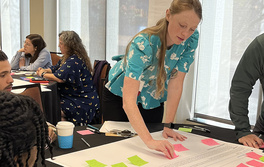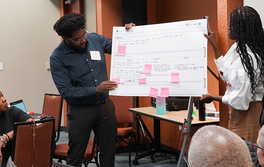
STATEMENT: American Jobs Plan Commits to Substantial Transportation Funding & Equity Focus, but Must Prioritize Goal-Oriented Investments & Access to Opportunity
The following is a statement from Harriet Tregoning, director of NUMO, the New Urban Mobility alliance, on the 2021 American Jobs Plan.
NUMO welcomes President Biden’s much-needed focus on the United States’ infrastructure that prioritizes people, climate and equity. The transformational American Jobs Plan gets so many things right and centers our attention on where it needs to be — investing in access to opportunity. The plan also recognizes that access is a system that includes many diverse elements beyond physical transportation, such as housing affordability, childcare and job training, and we applaud the administration’s efforts to address those elements.
As an alliance organization focused on mobility, NUMO particularly recognizes the following elements of the plan that contribute to building an equitable and sustainable transportation system:
- A fix-it-first approach to roads and bridges that prioritizes repair and modernization of existing infrastructure. This approach is a win-win. It is more effective at creating jobs than building new infrastructure and also gives us the opportunity to revitalize our woefully out-of-date infrastructure.
- A commitment to shovel-worthy projects, not just shovel-ready projects. Infrastructure investments lay the groundwork for decades to come. While speed of investment is important, it is far more critical to invest in the right project.
- A significant increase in federal funding for public transit — $85 billion — that calls explicitly for an expansion of service to increase access. Transit must be the backbone of any equitable transportation system, and this kind of serious investment is long overdue and extremely welcome.
- A focus on racial and environmental justice, including $20 billion in funding for reconnecting neighborhoods cut off from investment and ensuring affordable access to opportunity. This funding must be coupled, however, with policies that counter displacement and redress historic wrongs.
We applaud the administration’s comprehensive approach to investing in our country’s critical infrastructure. At the same time, we recognize that the details of how the plan is to be implemented will be critical to its success. Additional funding is helpful, but funding alone will not be enough to get us the transportation system we need. We must fundamentally rethink the existing system, which has been shaped by inequity and structural racism, while leveraging federal investments in ways that are both thoughtful and impactful. With that in mind, we strongly urge the administration to consider the following:
- Redefining the key performance measures of our transportation system to prioritize sustainably connecting people to opportunities and services. We cannot afford to repeat the mistakes of the past; this investment must be applied wisely. Access for people must be the goal, not just moving vehicles more quickly. Using access to destinations and vehicle-miles-traveled as the measures of success for our transportation system will result in more equitable and sustainable access for all.
- Amplifying the American Job Plan’s investment by spurring and leveraging investment on the state and local levels. State and local capital budgets are roughly 2% of GDP, and co-investments have the potential to magnify the impact of this substantial federal investment. The administration must explore how to best utilize funds to further galvanize local action.
The direction introduced in the American Jobs Plan is encouraging, but whether this funding is enough to set the nation on an unstoppable path to transportation decarbonization, racial justice, a comprehensive and inclusive economic recovery and universal access to mobility will depend on how those federal investments are allocated. NUMO looks forward to working with the Biden-Harris administration and Congress to make sure that the ambitions of the American Jobs Plan are fully realized.
Please direct media inquiries to Madlyn McAuliffe at madlyn@numo.global.
NUMO, the New Urban Mobility alliance, is a global organization that channels tech-based disruptions in urban transport to create joyful cities where sustainable and just mobility is the new normal. Founded in 2019 as an outgrowth of the Shared Mobility Principles for Livable Cities, NUMO convenes diverse allies and leverages the momentum of significant revolutions in mobility to target urban issues — including equity, sustainability, accessibility and labor — impacted by the shifting transportation landscape. NUMO is hosted by WRI Ross Center for Sustainable Cities.
Header image: Elvert Barnes / Flickr




